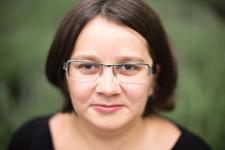KDE looks at the path ahead
What's Next

© Lydia Pintscher Image By VGrigas (WMF) – Own work, CC BY-SA 3
Two leaders of the KDE project report on priorities and celebrate a funding victory.
The KDE project recently received a $200,000 donation from the Pineapple Fund. Swap sat down with Lydia Pintscher, the president of KDE e.V. board, and Sebastian Kügler, the former vice president of the board, to understand the goals of the KDE project and how the KDE community will use the funds to further those goals.
KDE is one of the oldest open source communities. The KDE project was founded by Matthias Ettrich in 1996 as an attempt to build a better desktop for Unix systems. Today, the KDE project has evolved into a massive community that creates more than just a desktop environment for Linux and BSD. To better manage a growing community, Ettrich also created a non-profit organization called KDE e.V.
KDE e.V. supports the KDE community in legal and financial matters. According to Lydia Pintscher, "We also fund KDE-related events like Akademy and developer sprints. We pay the bills for the servers that host the source code, in addition to a lot of other things."
[...]
Buy this article as PDF
(incl. VAT)
Buy Linux Magazine
Subscribe to our Linux Newsletters
Find Linux and Open Source Jobs
Subscribe to our ADMIN Newsletters
Support Our Work
Linux Magazine content is made possible with support from readers like you. Please consider contributing when you’ve found an article to be beneficial.

News
-
The Next Linux Kernel Turns 7.0
Linus Torvalds has announced that after Linux kernel 6.19, we'll finally reach the 7.0 iteration stage.
-
Linux From Scratch Drops SysVinit Support
LFS will no longer support SysVinit.
-
LibreOffice 26.2 Now Available
With new features, improvements, and bug fixes, LibreOffice 26.2 delivers a modern, polished office suite without compromise.
-
Linux Kernel Project Releases Project Continuity Document
What happens to Linux when there's no Linus? It's a question many of us have asked over the years, and it seems it's also on the minds of the Linux kernel project.
-
Mecha Systems Introduces Linux Handheld
Mecha Systems has revealed its Mecha Comet, a new handheld computer powered by – you guessed it – Linux.
-
MX Linux 25.1 Features Dual Init System ISO
The latest release of MX Linux caters to lovers of two different init systems and even offers instructions on how to transition.
-
Photoshop on Linux?
A developer has patched Wine so that it'll run specific versions of Photoshop that depend on Adobe Creative Cloud.
-
Linux Mint 22.3 Now Available with New Tools
Linux Mint 22.3 has been released with a pair of new tools for system admins and some pretty cool new features.
-
New Linux Malware Targets Cloud-Based Linux Installations
VoidLink, a new Linux malware, should be of real concern because of its stealth and customization.
-
Say Goodbye to Middle-Mouse Paste
Both Gnome and Firefox have proposed getting rid of a long-time favorite Linux feature.
